In case you’ve never heard of it, the Basque Country is this beautiful region located in northern Spain on the Bay of Biscay, straddling the frontier of Spain and France. Its beautiful beaches, delicious food and amazing scenery make the Basque Country the perfect destination for any road trip itinerary.
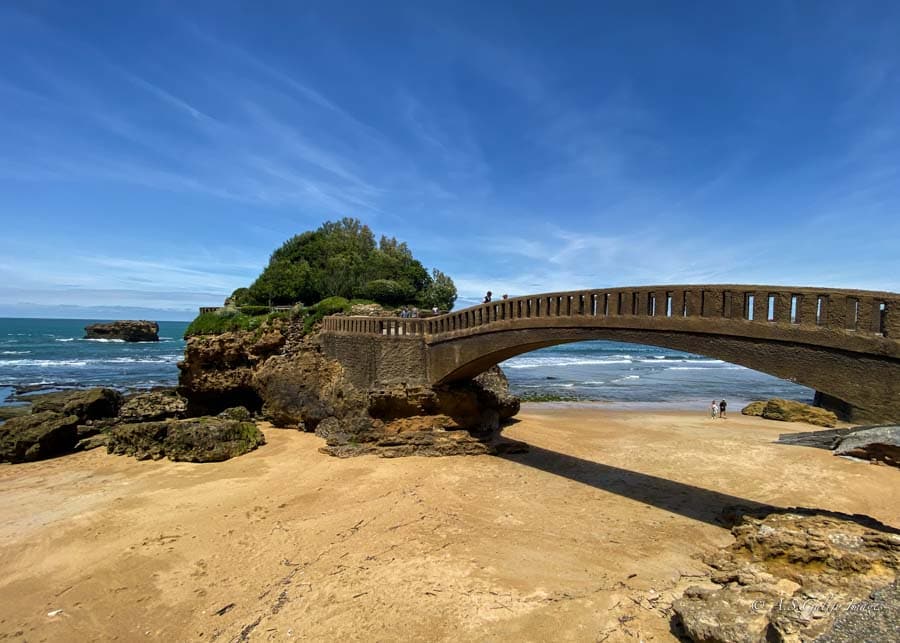
We recently experienced its delicious cuisine, unique culture, beautiful beaches and amazing scenery and want to share them all with you. In this post you’ll find travel tips for visiting the Basque Country as well as recommendations for the best places to visit. But before I get into more details about this road trip, let me tell you a few things about the Basque Country.
Table of Contents
Things to Know Before Visiting the Basque Country
If you are planning a visit to the Basque Country, there are a few things that you should know about it.
Who Are the Basques and What Language Do They Speak?
The Basques have one of Europe’s oldest and most unique cultures. Their language and traditions are very different from the rest of Spain, so there is a good reason why they consider themselves a very distinct cultural group. They cherish their unique language, music and folklore and try to preserve them the best they can.
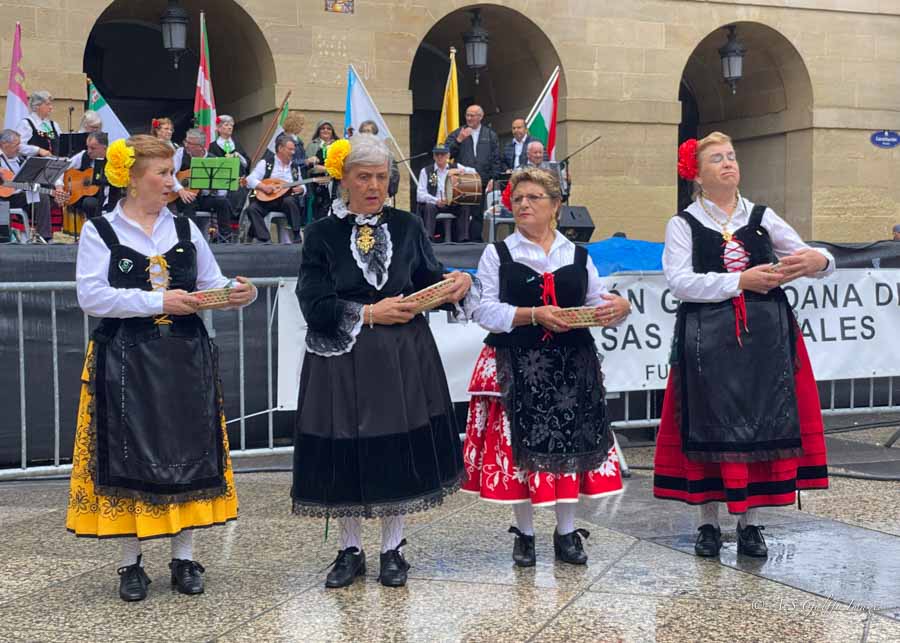
The Basques speak Euskera or Basque – a language totally unrelated to any other known language and which is also considered one of the oldest in Europe. Their culture is rich in traditions and has a varied gastronomy. Even their dances set them apart from the rest of Spain or Europe.
The Basque Gastronomy is Amazing
Basque cuisine is based on fresh ingredients sourced from the local farms or from the sea. It includes meats and fish, paprika, garlic, chili, sheep cheese and Basque cider.
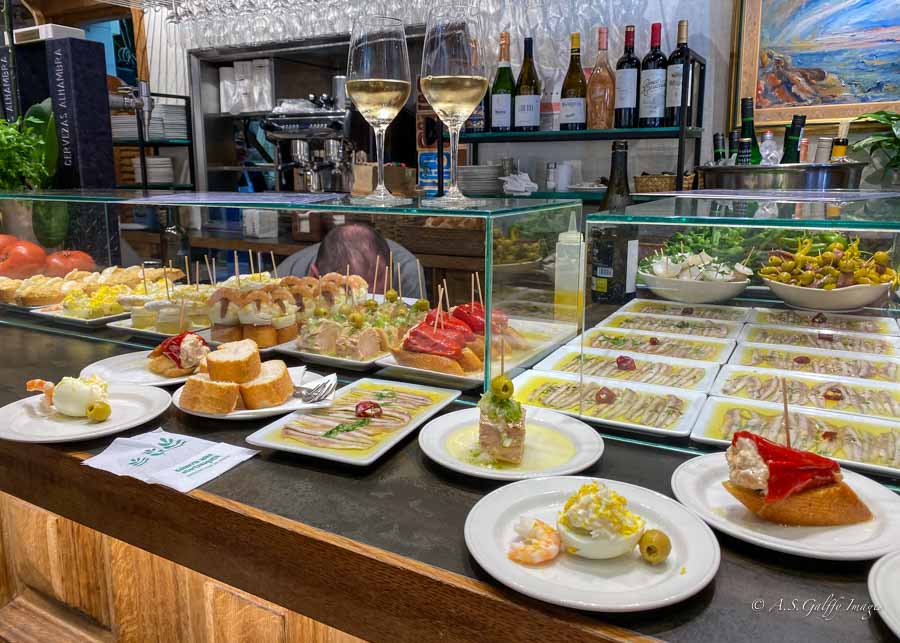
The most traditional food in the Basque Country are the pintxos, which are very similar to the tapas served in Madrid or Barcelona. Pintxos are small finger foods served at bars and taverns and are considered the backbone of the local food culture.
Very Scenic Landscape
High cliffs, green forests, strange rock formations and a large number of natural sites await you in the Basque Country. You’ll be surprised how green, lush and diverse the landscape is in this region. Even in the midst of summer, when the rest of Europe is baking in a heatwave, this region maintains its verdant color.
Be Prepared for Rain
But there is a reason for this green landscape. It rains often and during every season. Even in summer. Sometimes it’s just a short shower, other times it’s for a few hours, and often it rains for days in a row. But don’t get discouraged. It would be a shame not to visit the Basque Country because of this. Just be prepared with an umbrella, or a rain jacket because the weather can change very fast.
Planning the Perfect Basque Country Itinerary
This Basque Country itinerary is perfect for foodies, couples looking for cultural experiences and hidden gems, as well as families with children. We visited some of the places on this itinerary as day trips since we used 3 cities as a base for visiting the different attractions in the Basque Country.
Best Time to Visit
The nicest time to visit the Basque Country is from mid May through late September, more or less. You will usually have pleasant weather for much of this period, but should expect some chilly and rainy days on either side of it.
If you want more stable weather, you should probably visit in summer when days are longer and sunshine is fairly abundant. The temperatures go up to pleasant levels, but you’ll never get the unbearable heat you’ll find elsewhere in Spain.
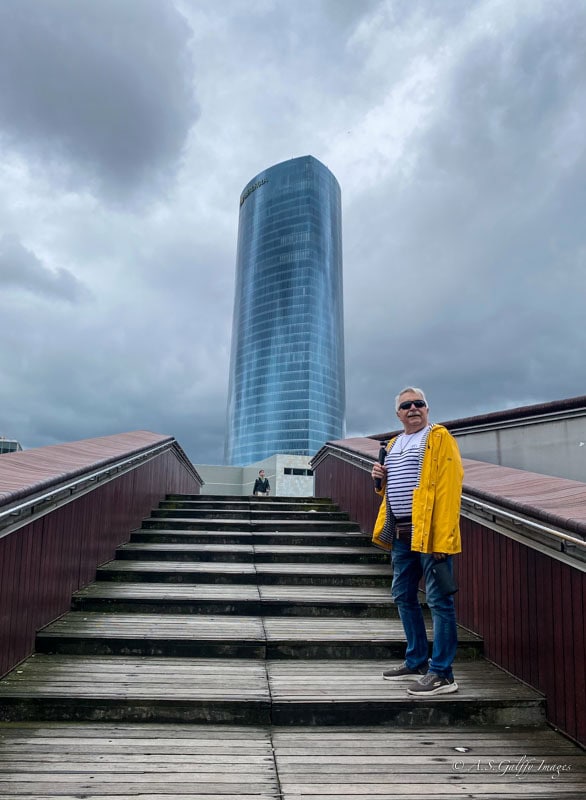
How Much Time to Spend
Another thing to consider is how much time to spend here. A visit to this region is worth taking no matter how long you have. However, in order to see the most important places in the Basque Country you’ll need 6-7 days for your itinerary.
Where to Stay
And last but not least, you’ll have to decide where to base yourself. Since the Basque Country is not a huge region, you’ll probably be okay staying in one or two places. I do not recommend staying in a different location every night. The time you would save by doing it would not justify the inconvenience of packing and unpacking every day.
We stayed in San Sebastián, Bilbao and Vitoria-Gasteiz which are all fun and interesting cities with lots of fine accommodations and great places to eat.
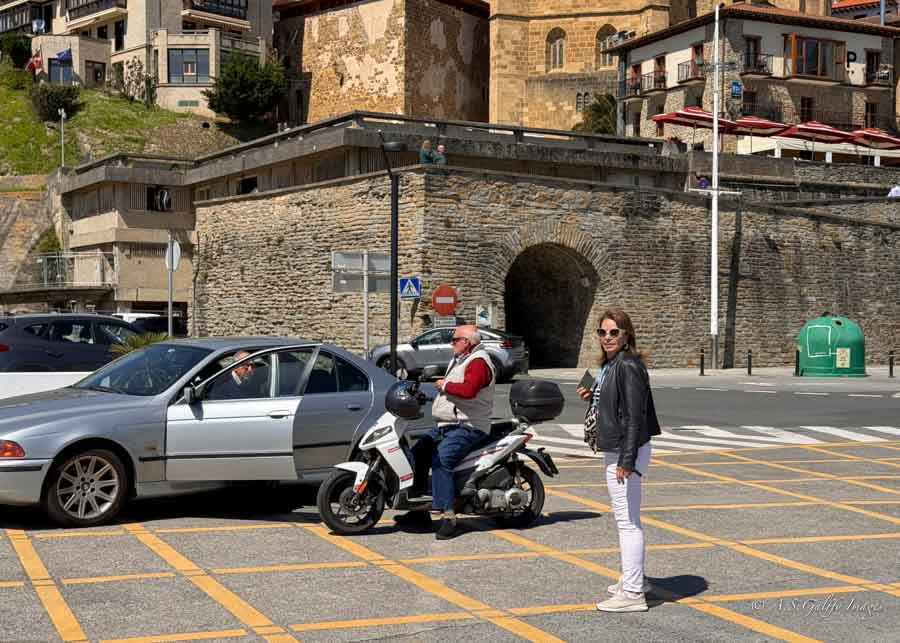
How to Move Around
Traveling through the Basque Country by car is one of those experiences that you absolutely must have if you get a chance. Of course, like most of Spain the Basque Country has excellent public transportation, but in order to be able to do this itinerary you’ll need a car.
Some of these places could be also visited by organized tours, but the experience will not be the same. If however you want to book one of these excursions, here are some you can choose from:
Where to Eat in the Basque Country

Basque Country 7-Day Itinerary
We started our road trip itinerary in Bilbao, the Spanish part of the Basque Country, and ended in Biarritz, on the French side of the Basque Country. This 7-day tour will help you discover the most beautiful driving routes in the Basque Country and experience its authentic culture and gastronomy.
Day 1 – Bilbao
Some 25 years ago Bilbao dirty and polluted industrial city. But after the construction of the famous Guggenheim Museum in 1997, the city began putting on a new face. A lot of effort was invested into creating an innovative image that included new metro stations, the Isozaki and Pelli towers, the Zubizuri bridge and lots of beautiful parks and green spaces.
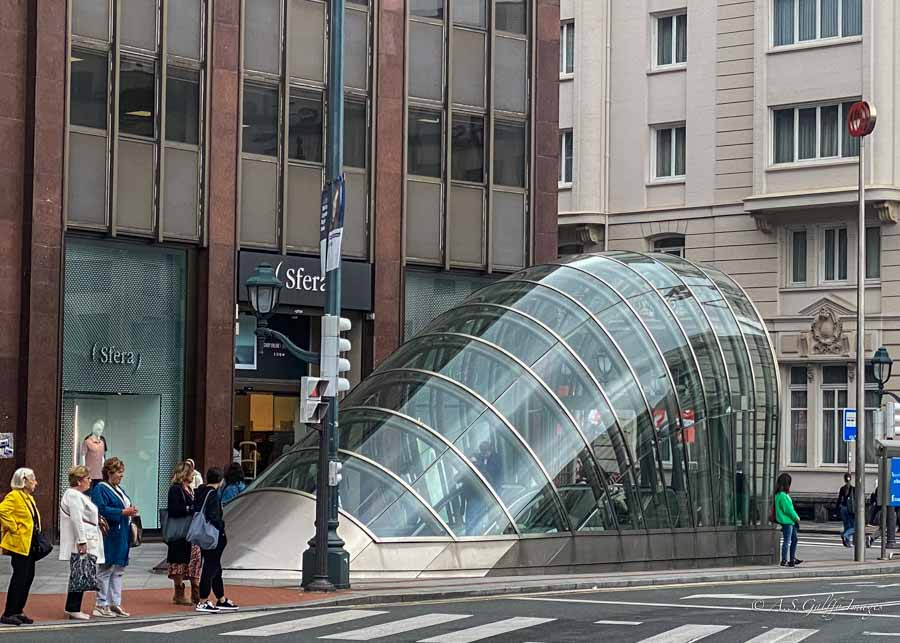
But that doesn’t take away from the charm of its characteristic old town, Casco Viejo. Here you can stroll around the narrow streets lined with a mix of shops and cafes, or discover iconic buildings such as the Cathedral de Santiago, or the elegant Teatro Arriaga inspired by the Paris Opera House.
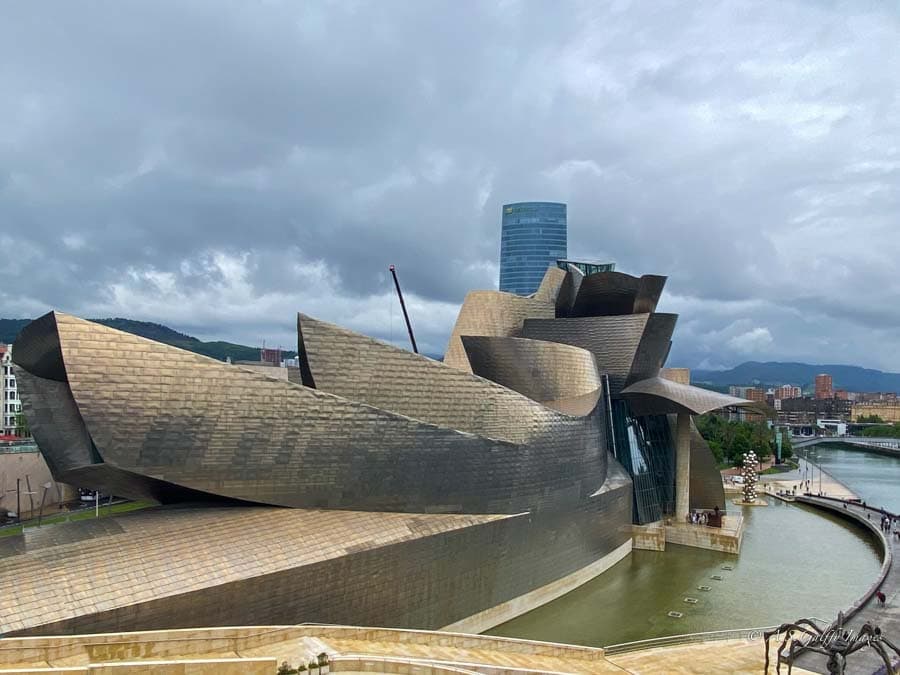
Attractions in Bilbao
Here are some of the attractions you shouldn’t miss in Bilbao:
- Guggenheim Museum. This avant-garde building designed by Canadian-born Frank O. Gehry is a magnificent place to display masterpieces of modern and contemporary art.
- Catedral De Santiago. Located in the heart of the old town on a very narrow street, the cathedral’s grandeur and Dhoti façade is hard to appreciate because it’s crammed among buildings.
- Castaños Neighborhood is one of Bilbao’s most attractive barrios. Here you can admire many elegant structures, like Puente Zubizuri, the building of the City Hall, or the Abando Train Station.
- Casco Viejo. A stroll in Bilbao’s old town is an absolut must.
- Funicular de Artxanda will take up up the hills that surround the city for a breathtaking view over the wild Basque mountains.
Day 2 – Donostia – San Sebastian
Spreading along a bay of white sand between the Mount Urgull and Igeldo mountains, San Sebastian is undoubtedly the most attractive city in the Basque Country. Its charm comes from the interesting landscape combination of mountains and sea, turn of the century architecture, as well as renowned Basque gastronomy.
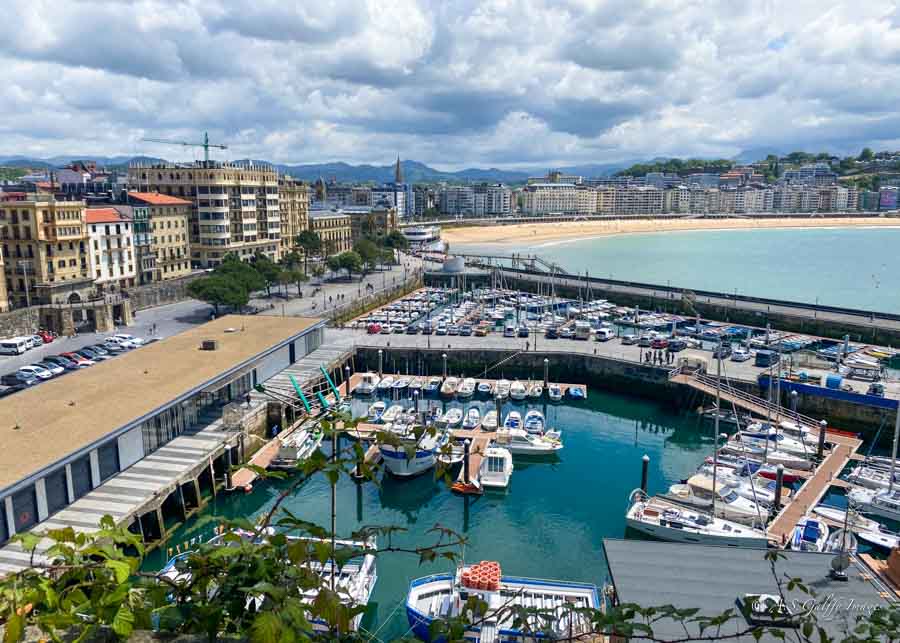
The city is laid around the Bay of La Concha, while Mount Igeldo marks the limit at one end. San Sebastian is especially known for its pintxo culture. Pintxos are mini-bites laid out in front of you in bars, very similar to the tapas, served in the rest of Spain.
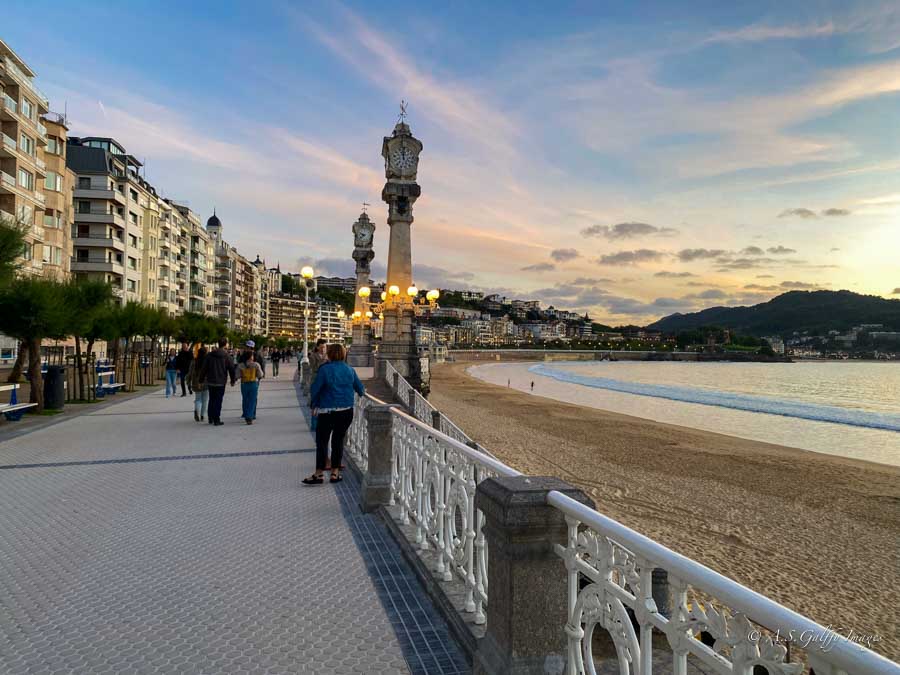
Attractions in San Sebastián
Here are some of the attractions you shouldn’t miss in San Sebastian:
- Old Town San Sebastián is the real social center of the city. Its narrow pedestrian alleys are crammed with pintxos bars and emblematic buildings like the Basilica of St. Mary, or St. Vincent’s Church.
- Plaza de la Constitucion lies at the heart of the Old Town. This is the scene of all major local festivities and gatherings.
- San Vincente Church is the oldest church in the city, built in Gothic style.
- Basilica of Santa Maria is a Baroque style church dating from the 18th century.
- La Concha Beach is the city’s main beach, considered one of the most beautiful beaches in Europe. The area is particularly beautiful in the evening, when pedestrians stroll along its promenade.
- Mount Urgul is the city’s most dominating feature. At the top of the hill is the statue of Christ the Redeemer, an impressive monument reminiscent of the one in Rio de Janeiro.
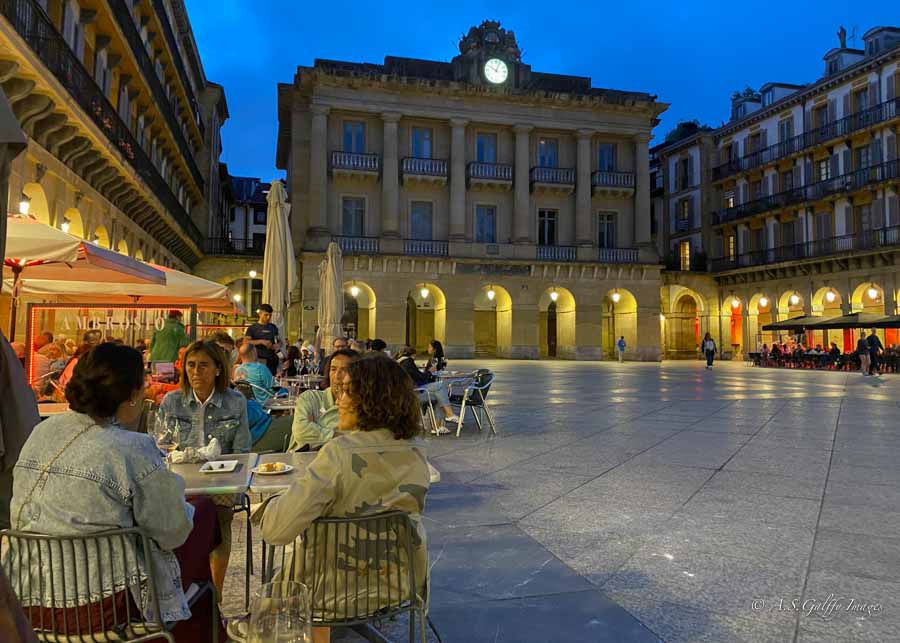
Day 3 – Vitoria-Gasteiz
Next on our road trip was Vitoria-Gasteiz, the capital of the Basque Country. When compared to San Sebastián or even Bilbao, it may seem a little more modest, but don’t underestimate its charm. The town is extremely tidy, the streets and squares are spacious and enjoyable to wander along and lined with many interesting shops and bars to relax in. You feel safe here.
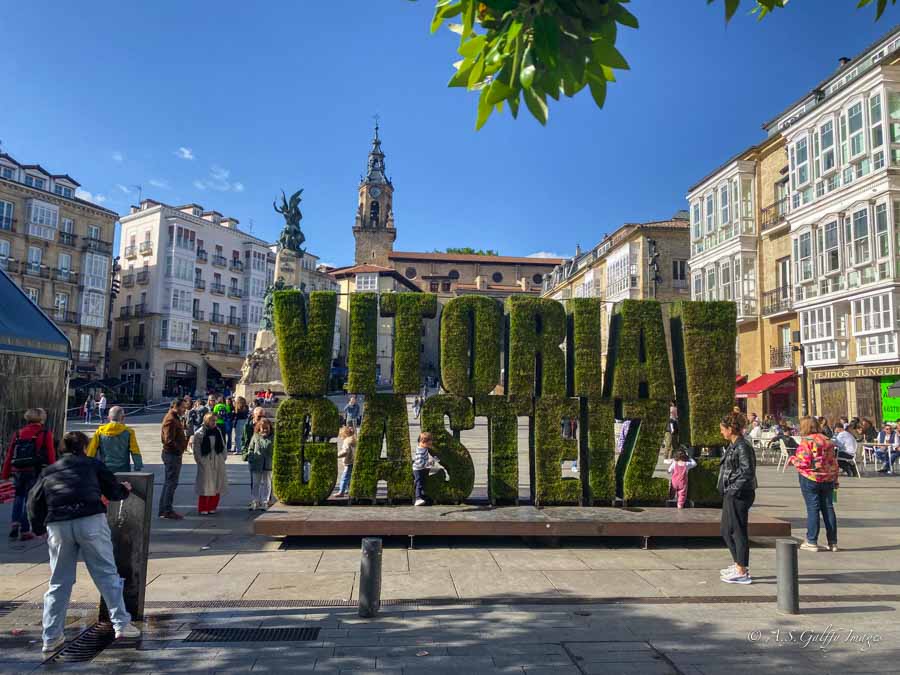
Vitoria is more traditional Basque, with not that many tourists and thus with a normal Basque life. A a vibrant town with many live concerts and an enjoyable social life. The local bars offered a range of delicacies to taste with good and friendly service. We stayed in the small centrally located NH Canciler Ayala Vitoria hotel. This was an excellent location to be able to easily access the centre of the older town.
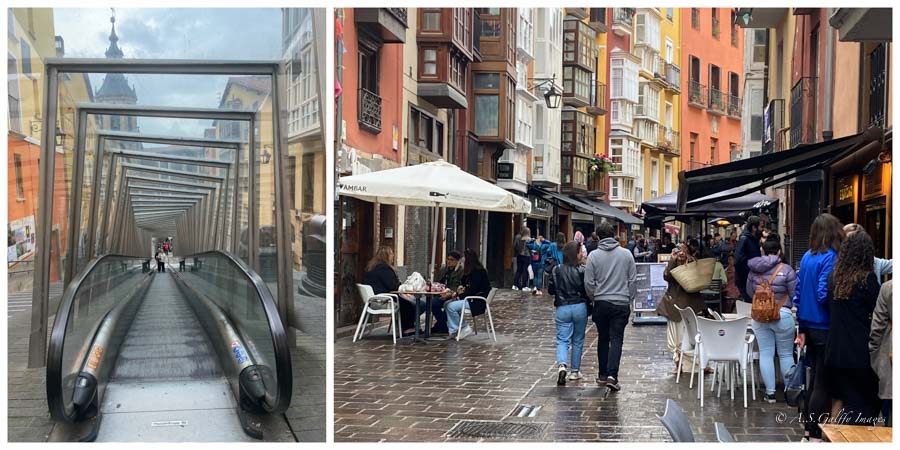
Attractions in Vitoria-Gasteiz
The medieval quarter is undoubtedly the most beautiful part of the city, with windy streets lined with unique bars and eating places, lovely architecture, beautiful churches and numerous museums. Here are some of the attractions you shouldn’t miss:
- Plaza de la Virgen Blanca, which is in a very special setting, surrounded by terraces where you can taste some pintxos of our famous cuisine
- Church of San Miguel is the oldest temple in Vitoria, dating back to 1,100s.
- Cathedral of Santa María which was initially a church-fortress, being part of the city’s defence walls.
- Plaza de España, also called Plaza Nueva, an impressively large square with attractive buildings, attractive bars and restaurants where you can sit outside and relax.
- Florida Park, the most emblematic park in Vitoria-Gasteiz, created in in the style of the Romantic French gardens of the 1800s.
- The Old City Walls, dating back to the 11th century.
- The Furnier Card Museum, where you can admire the evolution of playing cards through history in different countries, both in terms of manufacture and content/design.
Day 4 – Salina Añana & Labastida
About 30 km away from Vitoria-Gasteiz in one of the oldest salt factories in the world: Salina Añana. The Añana salt flats are more than 6500 years old and brag about producing salt that is completely pure, as it comes from an ancient sea.
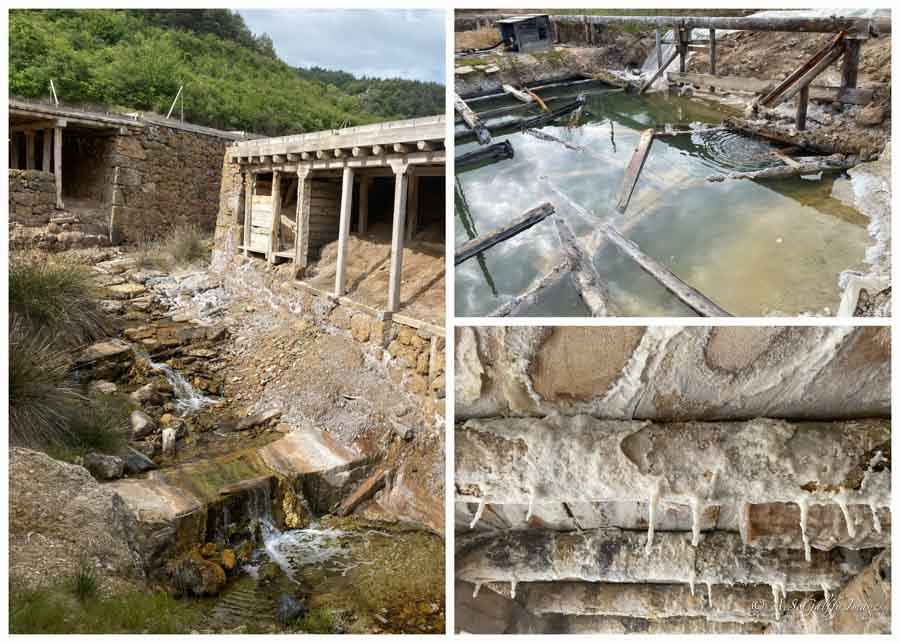
Even if you’ve seen salt mines before, you should still visit this one because it’s one of the most spectacular salt “factories” in Europe. The Salt Valley of Salinas de Añana is a beautiful outdoor landscape with a very unique geology and ecosystem.
But perhaps the most interesting thing is the way they produce salt here. Everywhere you turn you’ll see platforms on which the brine, saltwater is poured to obtain salt through solar evaporation.
Labastida is a small town of about 1000 inhabitants, located about 48 km away from Vitoria. Archeological discoveries from this area prove that this settlement dates back to the prehistoric era. It is believed that La Bastida was built based upon the design and layout of the city of Troy.
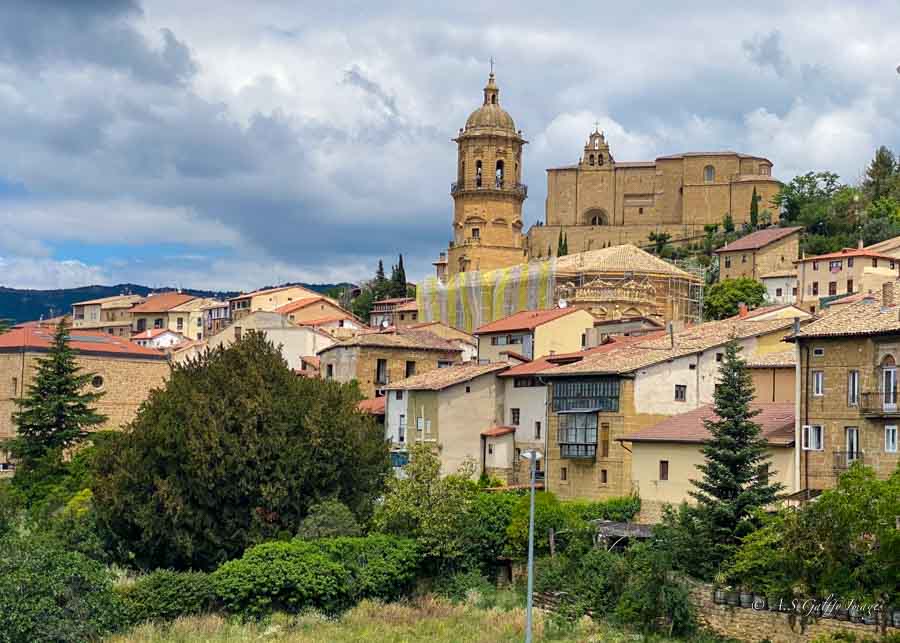
In addition to having a historic center with palaces and ancestral homes, Labastida is also home to many wine cellars and wine caves.
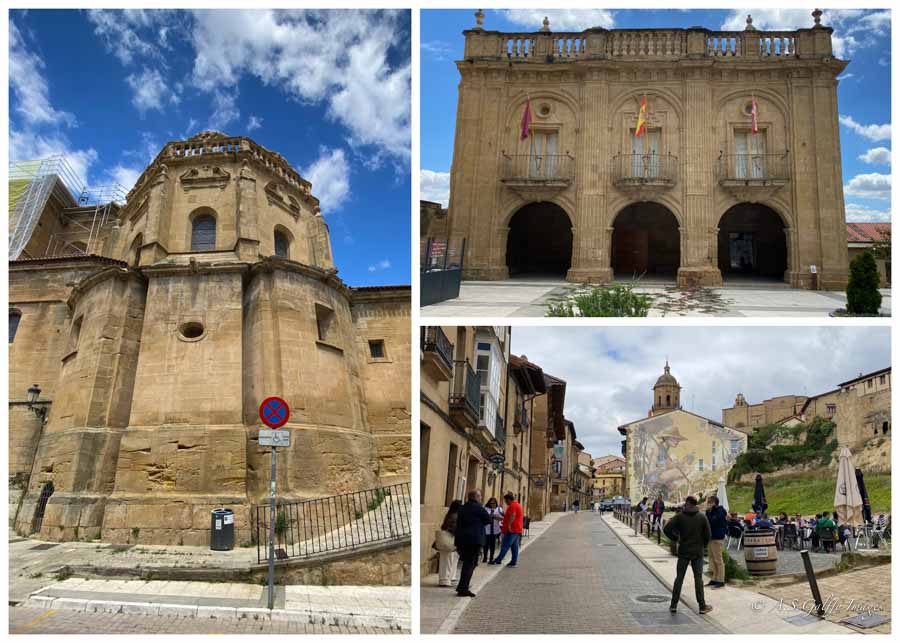
While walking through the medieval quarter, don’t miss the beautiful Old Town Hall, the Palace of the Salazar family, the Church of Nuestra Señora de la Asunción, and the Hermitage of the Holy Christ, at the top of the hill.
Day 5 – Basque Coast
Visiting the costline is a must for any road trip in Basque Country. The entire Basque Coast is dotted with small villages, gorgeous natural parks, craggy clifftops and some of the most picturesque settings in all of Spain.
Bermeo
Bermeo is a fishing town whose harbour preserves all its traditional local seafaring charm. This is one of the most important fishing ports in the Basque Country which it’s also part of the Urdaibai Biosphere Reserve.
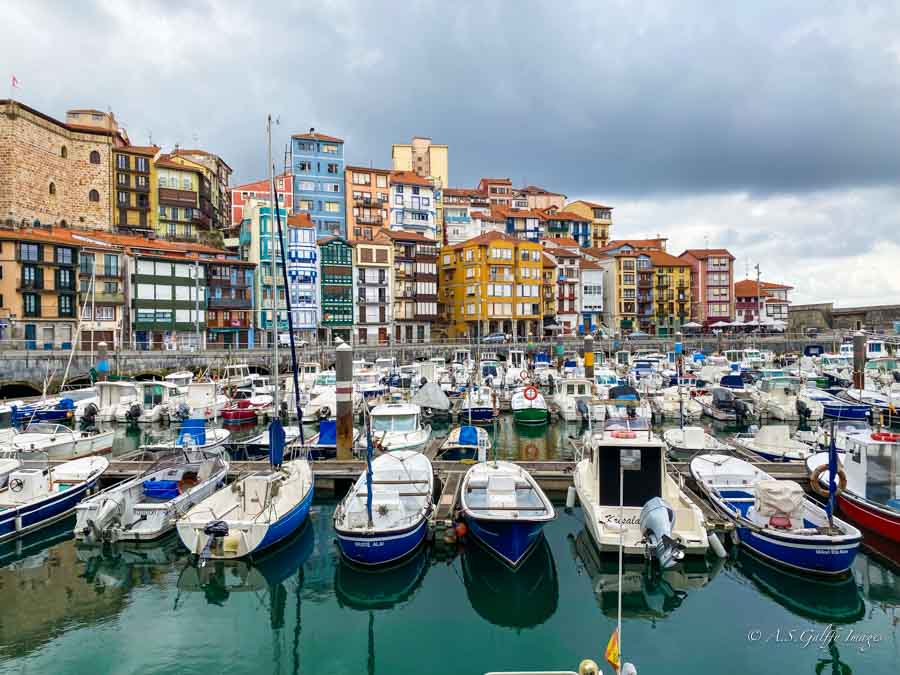
There is not much to do here other than walk around the harbor where you can see large fishing vessels and markets. However, Bermeo is one of the most beautiful fishing villages on the coast of Biscay, so take your time to enjoy its peaceful atmosphere. There are a few small eateries along the shoreline where you can stop for lunch.
Guernika
Guernika (also spelled Gernika) is perhaps the most important historical town in Basque Country. The town was founded in 1366 in a strategic position close to the estuary of the Mundaka River. Over time, Gernika became an important town for the Basque culture. It was the seat of parliament for the province of Biscay.
During the Spanish Civil War the city was bombed by the fascist army. The decision was made to launch an attack that would not only kill the resistance leaders, but would also crush the spirit of the Basque people. The air raid lasted for over three hours during which time over 5000 people were killed or injured.
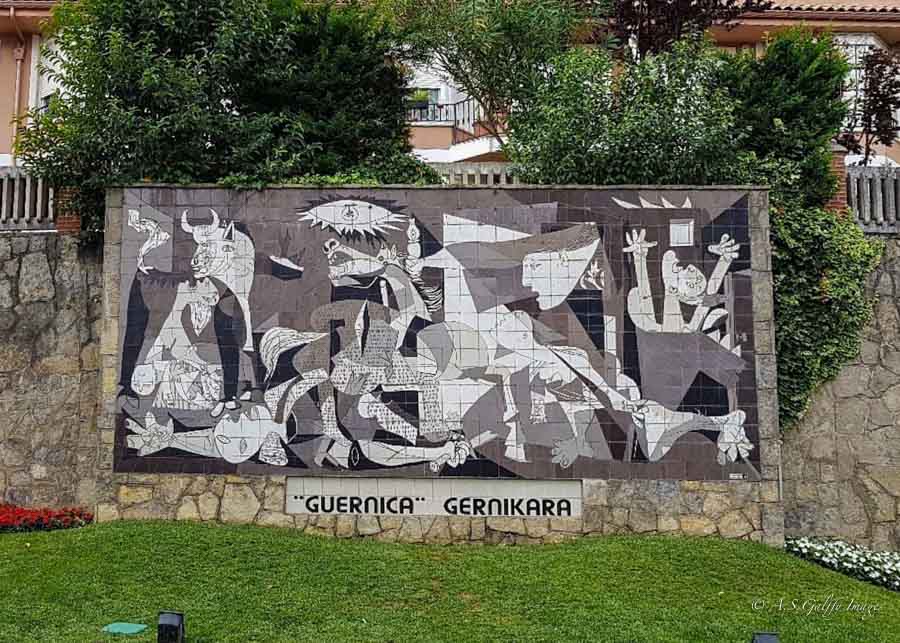
This tragic event formed the basis of Pablo Picasso’s most iconic work: Guernica. The town has since become a universal and powerful symbol warning humanity against the suffering and devastation of war.
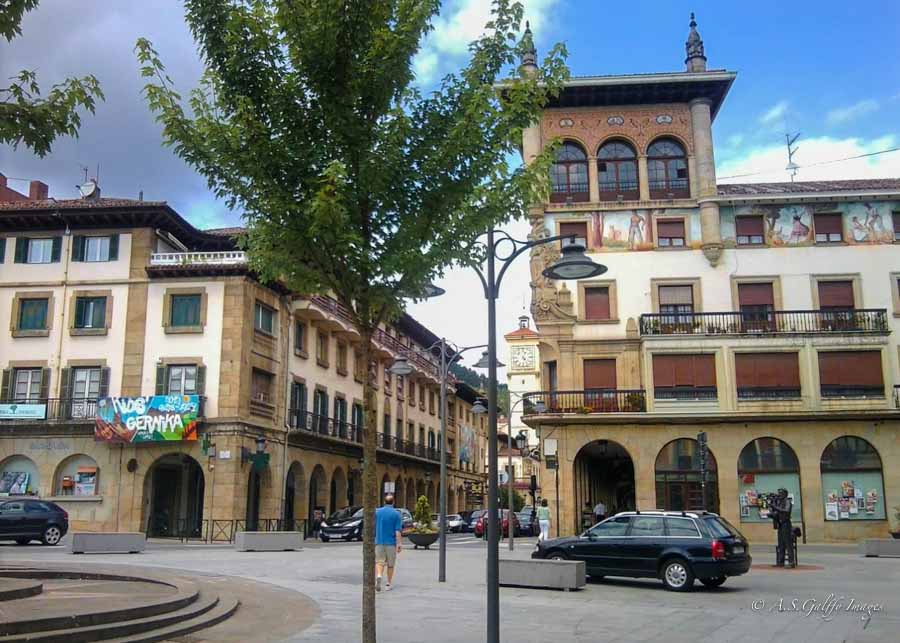
Nowadays Guernica is a very nice town, scenic and full of history. You can see Guernica’s Oak Tree – a symbol of Basque freedom, the Museum of Euskal Herria, and the Peace Museum.
San Juan de Gaztelugatxe
Another interesting stop on our Basque Country itinerary was San Juan de Gaztelugatxe. This idyllic islet is located between the coastal towns of Bakio and Bermeo. But to reach it you’ll have to climb down to the beach, cross the stone bridge and then climb up a 241-step staircase. At the top of the staircase you’ll find a picturesque chapel, which is not the original church which was built here in the 9th century.
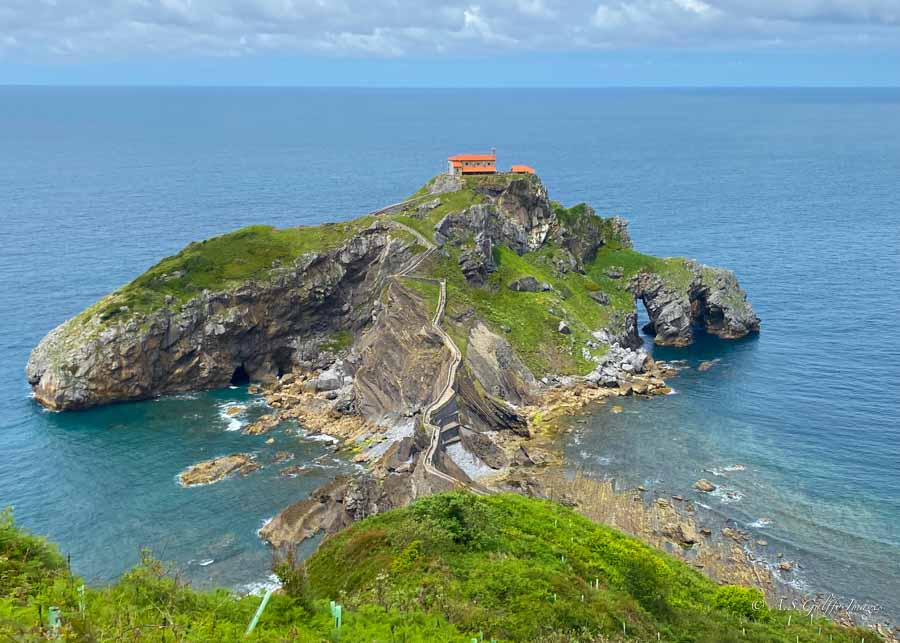
The much-photographed Gaztelugatxe was made popular first by pirates, and centuries later by Game of Thrones fans who came to see the famous “Dragonstone” from the famous TV series. The name Gaztelugatxe name can be translated as “castle rock” from Basque.
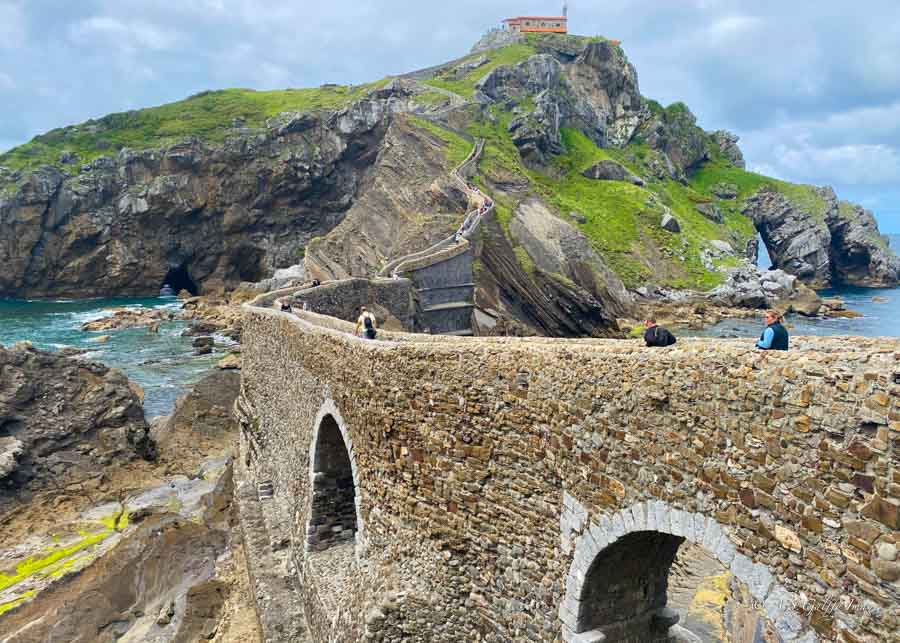
Getting to the top of the rock is kind of tiring, but not really a problem if you are reasonably fit.
Zumaia Geopark
Another stop on this Basque Country itinerary is Zumaia and the Basque Coast Geopark, a UNESCO World Heritage Site. The 13km of coastline within the Geopark is made up of the most amazing rock formations which date from prehistoric times.
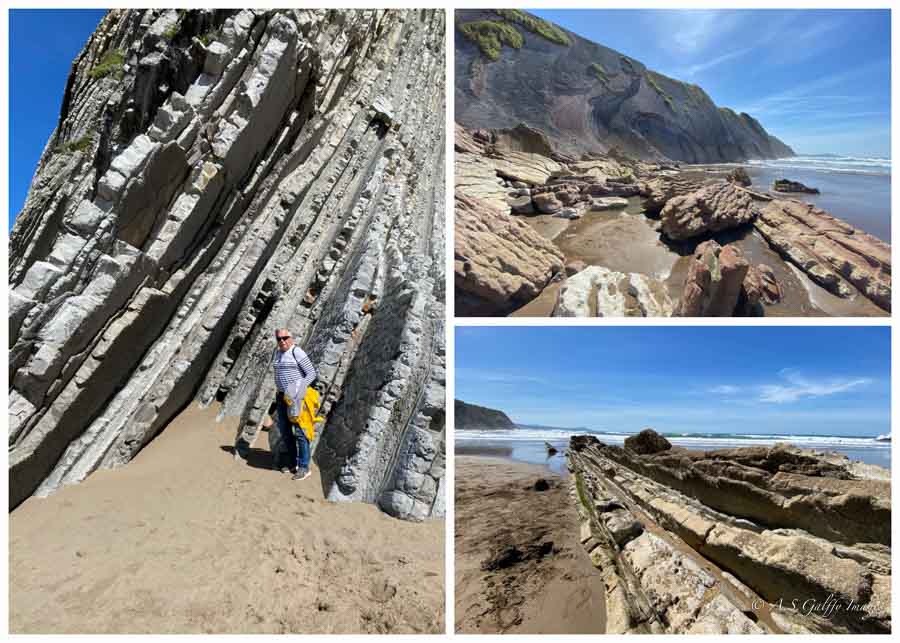
The rocks are unbroken deposits of marine sediments that formed over millions of years, mainly due to the rapid changes in sea level.
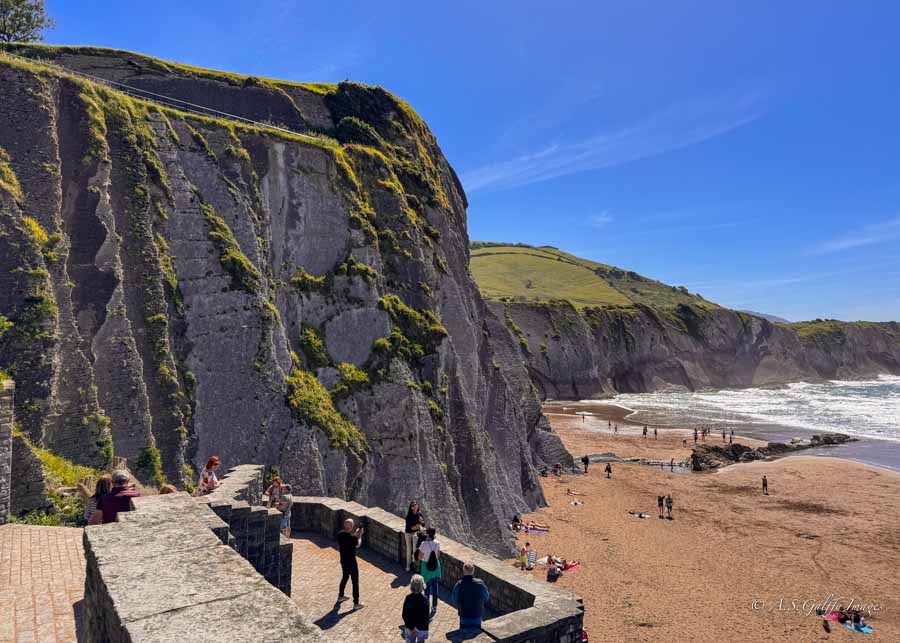
If you have time you can walk the entire coast which is very beautiful, but if you only want to see the rocks there is an easy access next to Zumaia beach. On the left side of the beach there are several caves. On the right side are the razor-shaped formations and also the impressive cliffs. This is where some famous scenes from Dragonstone (Game of Thrones series) were filmed.
Day 6 – Getaria
Just a short drive from San Sebastián is the little fishing port of Getaria. This cute port town is famous for the quality of its gastronomy, which uses the grill for meat and for fish. It’s very interesting to see charcoal grills on almost every porch in Getaria.
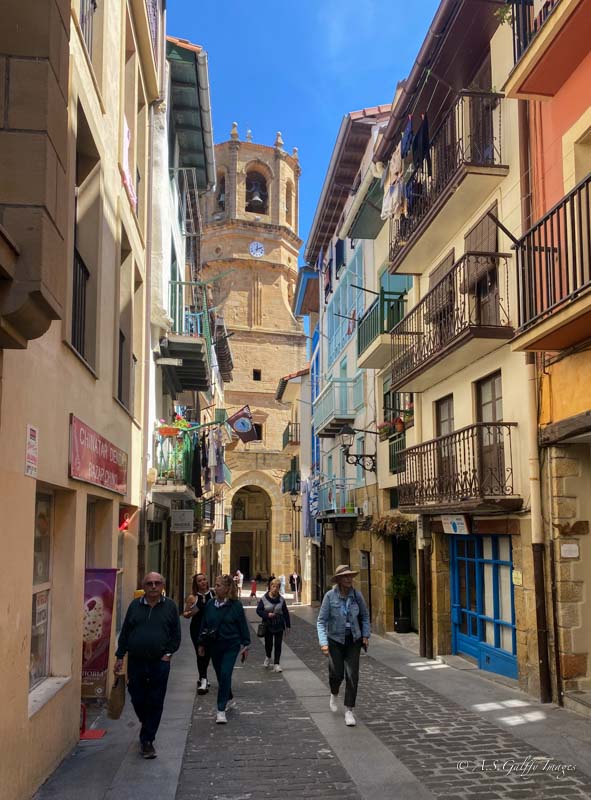
The surroundings are full of txakoli vineyards. Of course it’s possible to try different txakoli wines in the bars and restaurants of the town, but if you really want to sample the wines before you buy you should go for a wine tasting to one of the nearby wineries.
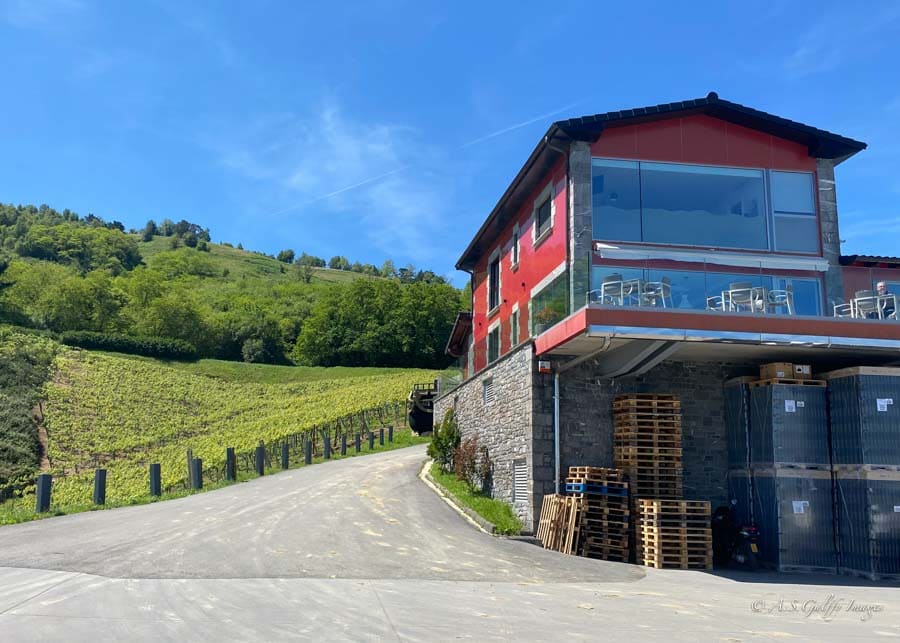
Getaria is also famous for being the birthplace of Juan Sebastián Elcano, the Spanish navigator who first circumnavigated the Earth in the Spanish ship Victoria on the Magellan expedition to the Spice Islands. In the central square of the town you can see his statue.
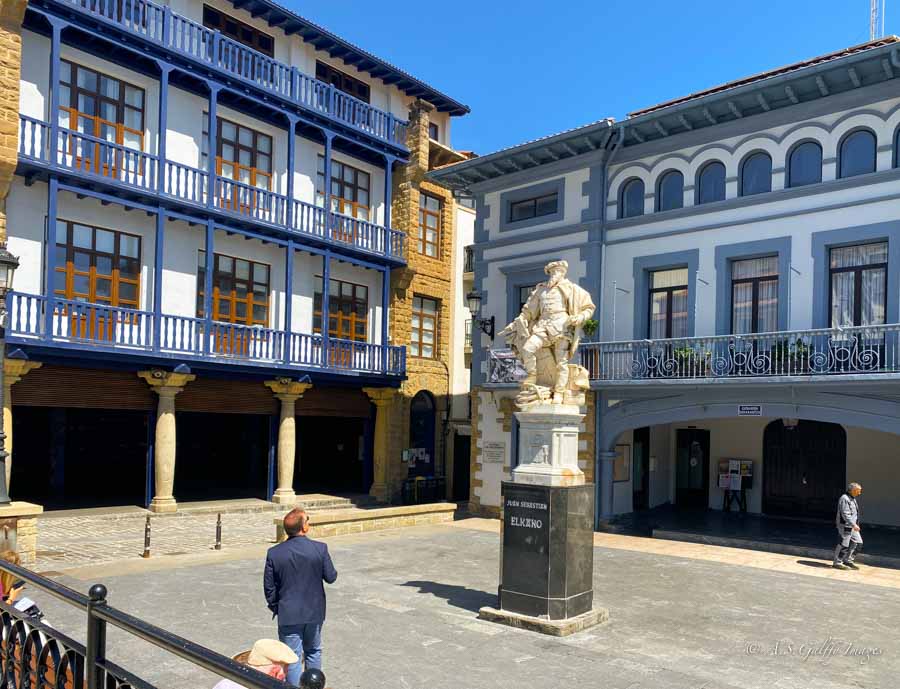
Also interesting to note is that Getaria is part of the famous Camino de Santiago – Camino Norte pilgrimage route.
Day 7 – Biarritz
Our 7-day road trip itinerary ended in Biarritz, which is located in the French Basque Country (Pays Basque), only 148 km from Bilbao. It appears that the resort town of Biarritz has been a favorite beach getaway since Napoléon III and his Spanish-born wife Eugénie arrived here during the mid-19th century.
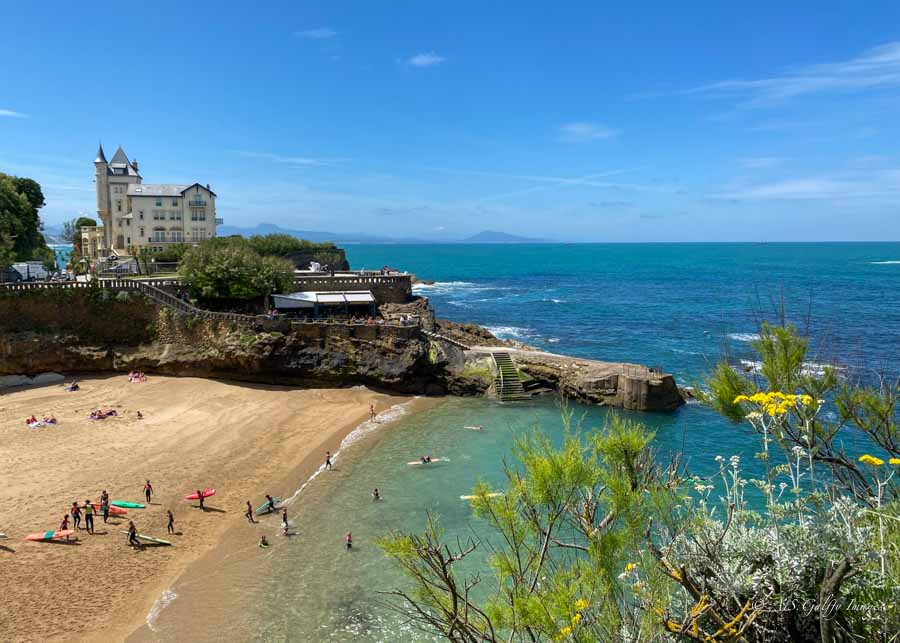
The city’s past glamour is still displayed in the old residences and elegant villas that glitter with belle époque and art deco details. But sadly, the newer constructions are not so appealing. All along the seafront you’ll see plenty of ugly concrete buildings that don’t really help the aesthetic appeal of Biarritz!
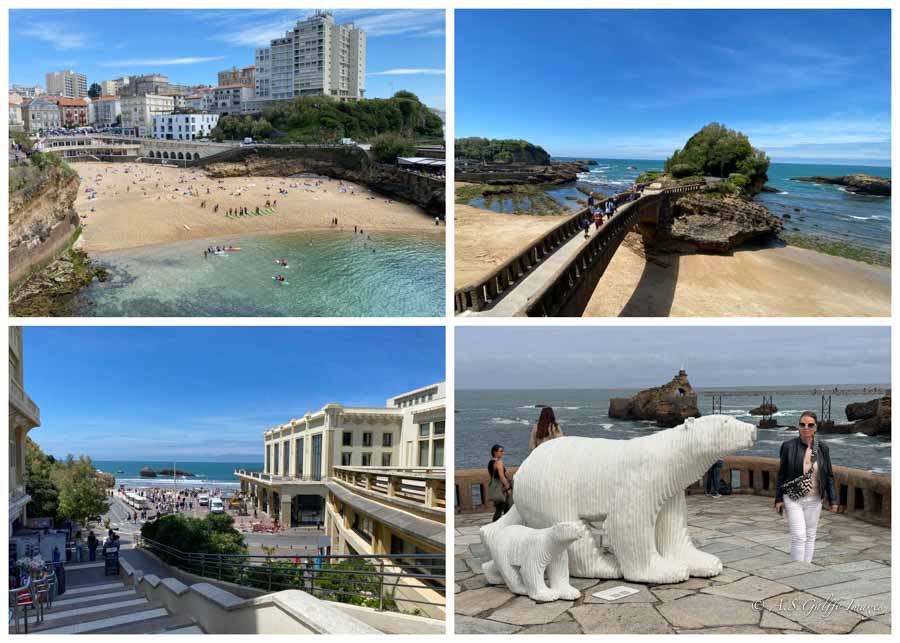
The Atlantic coast of France may lack the constellation of beautiful towns and villages on the Côte d’Azur, like Nice or Éze Village, but it still displays tremendous beauty. The rugged coastline of the Bay of Biscay dotted with small beaches and coves make Biarritz one of the most attractive beach towns in the world!
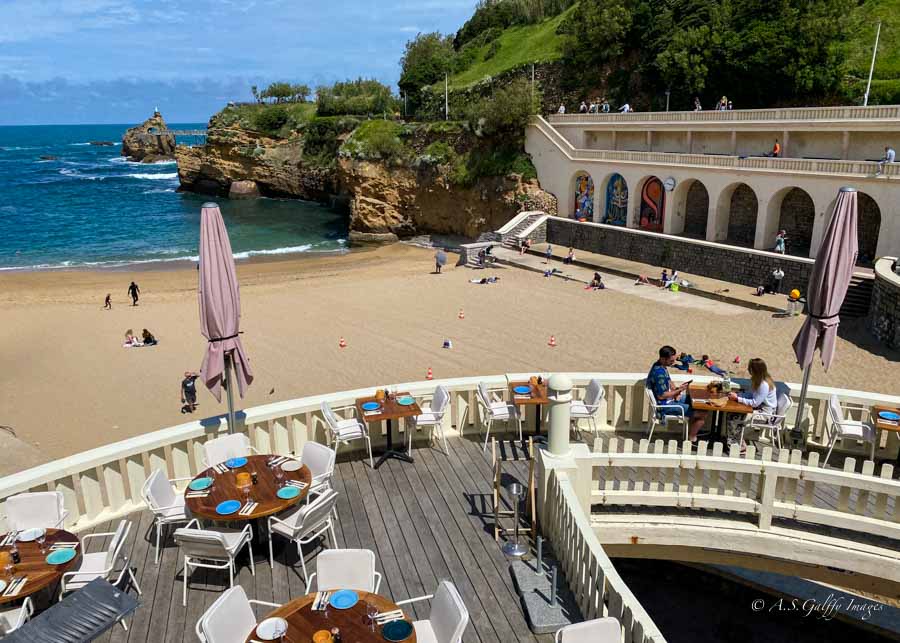
Top Attractions in Biarritz
The old town of Biarritz is easy to walk, so one day should be quite enough to its attractions. These are the top things to do:
- Côte de Basques if you walk down the stairs to the park Saint Jean Lasalle, you can admire the bay and also many surfers if the tide is right.
- Rocher de Vierge (the Rock of the Virgin). This is one of the most emblematic monuments in Biarritz – a rock in the middle of the ocean with a statue of the Virgin on top. The rock is connected to the land by a steel bridge that was designed by Eiffel, the same architect who designed the Eiffel Tower in Paris. The bridge is by itself a perfect platform to enjoy views of both bays in Biarritz.
- Small beach of Port Vieux This small beach is wave-free and it is a perfect spot to enjoy a coffee or some lunch at one of the restaurants around it.
- La Grande Plage if you take a walk on Avenue de l’Imperatrice you’ll enjoy some of the XIX century villas that made of Biarrtiz a famous luxury resort. This will also take you to the Grand Plage, which is one of the main attractions in Biarritz.
- Biarritz Aquarium, also known as le Musée de la Mer, is is one of the most beautiful aquarium I’ve ever seen, so don’t miss it! It has a large collection of fish and marine animals.
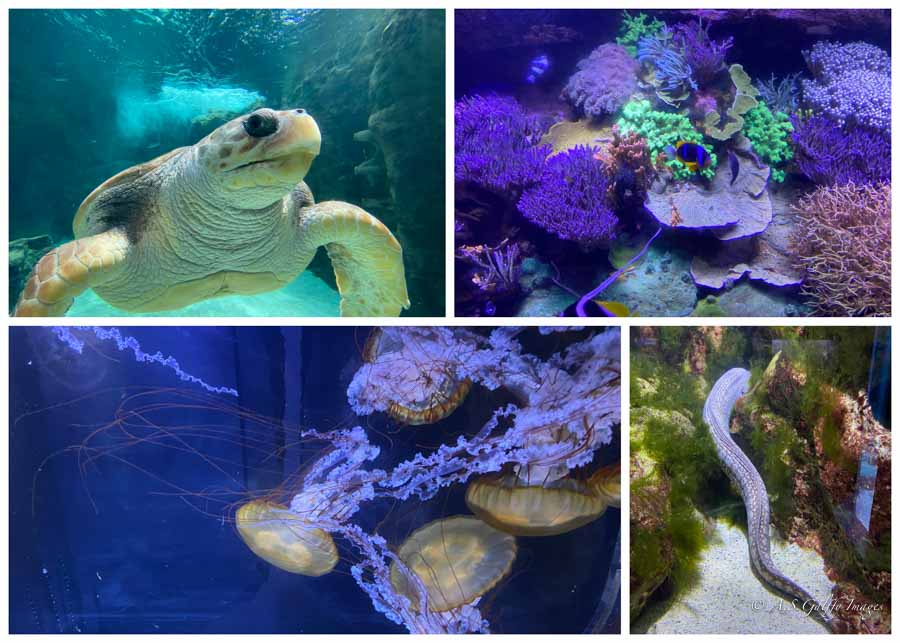
The Spanish Side vs. the French Side of the Basque Country
Although they are barely 12 km away from each other, the Pays Basque (the French Basque Country) couldn’t be more different than the Spanish Basque. The two sides are small in population, but fiercely loyal to their own culture and the Basque language.
The villages of the French Basque look very different architecturally from those on the other side. I found the building on the Spanish side to be more upscale and better maintained than the ones on the French side. That’s especially true for San Sebastián, whose architecture is truly majestic, combining various influences and appearances rather than having a clearly defined style.
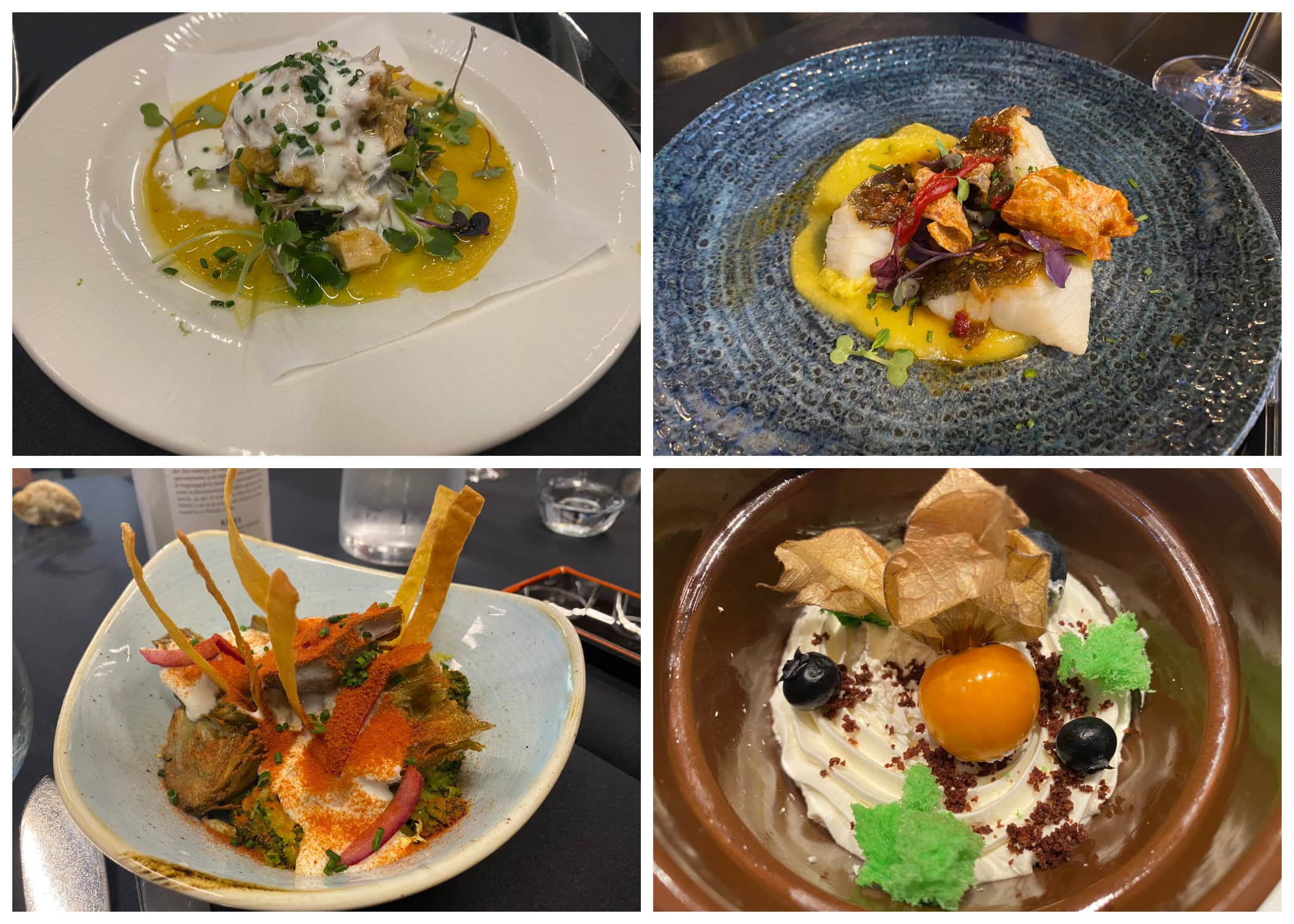
But the most noticeable difference was the food. What attracted us more on the Spanish side was the vibrant tapas (pintxos) culture that you won’t find in the Biarritz area. But pintxos aside, I found the Spanish food to have a more intense flavor.
Also, the inhabitants of the French towns seem to go to bed earlier than their Spanish neighbors. There’s less nightlife on the French side and you won’t find the plethora of atmospheric cider houses and pintxos bars that you have in San Sebastián, or in Bilbao.
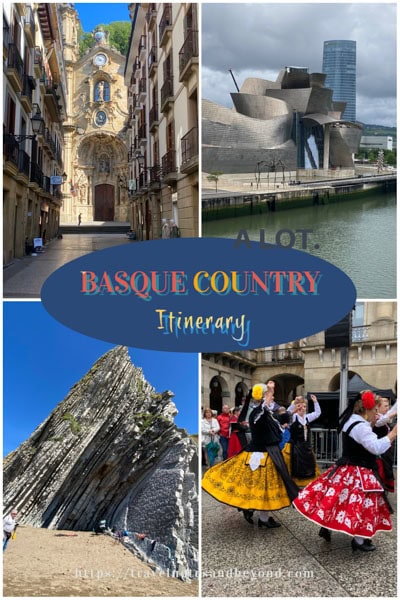

 Best Things to Do in Corfu – Your Essential Island Guide!
Best Things to Do in Corfu – Your Essential Island Guide!



Pra
Thank you for sharing this detailed guide on the Basque Country. This itinerary offers a fantastic look into the region’s rich culture, history, and stunning landscapes. From the unique Basque language and delicious pintxos to the lush, diverse countryside, the Basque Country is certainly a destination that provides a wealth of experiences. While it’s important to be prepared for occasional rain, the beauty of the area makes it well worth a visit any time of year. Your guide provides excellent advice for planning a trip and ensures travelers get the most out of their time in this vibrant region.